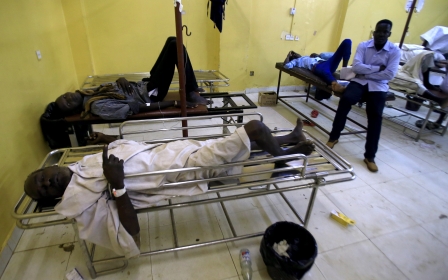Coronavirus: Faith in Sudan health system shaken as first death stirs fears

Faith in the ravaged Sudanese health system left behind by former ruler Omar al-Bashir has proven limited as news of the country's first coronavirus case sent the population panicking.
A public health crisis could pose a major challenge to the military and civilian power-sharing government that replaced Bashir, with the country's public health system already suffering from limited medical supplies and overworked staff.
The government announced on Friday that a Sudanese man had died from coronavirus earlier in the week, the first known case in the country.
"Given the fragile health situation in Sudan and the deteriorated health facilities and infrastructure we inherited as a transitional government from the former regime, we need urgent assistance to confront this crisis before it becomes a disaster," a finance ministry official told Middle East Eye, on condition of anonymity.
"We are in intensive contact with different international bodies including the International Monetary Fund, World Bank and different UN agencies and other NGOs in order to help in funding and providing materials and facilities as fast as possible."
The government quickly announced a series of measures, including stopping public events, banning travel from eight countries and putting a limit of the number of international flights. Last week, a flight from UNAMID, the joint UN and African Union peacekeeping mission in the conflict-hit Darfur region, was turned back because it would be bringing staff from 15 countries.
In Darfur's Zamzam displacement camp, camp co-ordinator Adam Osman told Middle East Eye that many of the displaced people are worried that soldiers could bring the disease from abroad. He questioned their presence, accusing them of failing to bring peace to Darfur.
UNAMID’s spokesman Ashraf Issa said two suspected cases are being quarantined.
In the capital Khartoum, many people have been panic buying hygiene and medical supplies and stocking up on food in order to avoid public spaces.
Pharmacist Ahmed Alnur called on the health ministry to provide face masks and other items for free.
"All these items are needed, and we know it's expensive and there is a lot of poverty in Sudan, so the ministry should provide them," he said.
Faisal Alyas, 52, died in a Khartoum hospital on Thursday, becoming the first Sudanese victim of the global epidemic.
A relative told MEE that Faisal had visited the United Arab Emirates earlier in March and later showed symptoms of the Covid-19 virus but initially tested negative.
"After Faisal’s death, the authorities prevented us from doing the funeral ceremony and this caused a lot of panic, but we understand that it's part of the preventive measures to protect the people," said the relative, who preferred not to be named.
Sports events are being held behind closed doors, and all official conferences have been cancelled while the government considers whether to close schools and universities.
Public health activist Haitham Makkawi has warned against overreaction, saying "the consequences of panic are more dangerous than the virus itself".
He also noted that lessons could be taken from how other resource-limited countries, such as the Democratic Republic of Congo, had been able to overcome the Ebola epidemic.
"The development of safe, efficient vaccines and advanced diagnosis that can be used easily in low-resource, remote areas, in addition to the other factors such as community trust and engagement can also be very useful.
"We also have experience in this regard in Sudan, during the rainy seasons and other disasters," he said.
Middle East Eye delivers independent and unrivalled coverage and analysis of the Middle East, North Africa and beyond. To learn more about republishing this content and the associated fees, please fill out this form. More about MEE can be found here.





